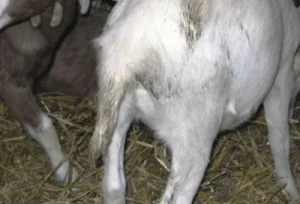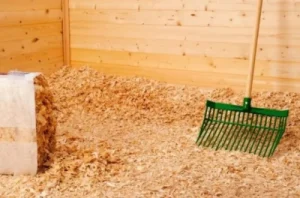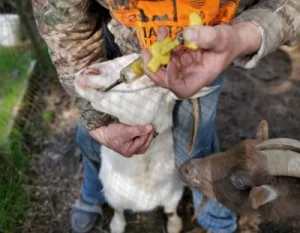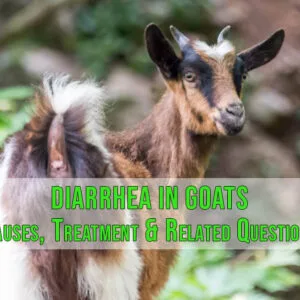No products in the cart.
Goat
Diarrhea In Goats: Causes, Treatment & Related Questions
Goat diarrhea is a common cause for baby goats that leads to death in kids of 1-30 days old.
Even though it is not an illness itself, goat diarrhea is a symptom of a more serious health problem.
Therefore, in order for diarrhea to be properly treated, you should know the reasons for diarrhea in goats.
Look no further and read our article below on how to treat diarrhea in goats.
*This post may have affiliate links, which means I may receive commissions if you choose to purchase through links I provide (at no extra cost to you). As an Amazon Associate I earn from qualifying purchases. Please read my disclaimer for additional details.
How To Diagnose Diarrhea In Goats

In young goats that are affected, a loose stool develops.
The texture might vary between pasty and very watery diarrhea. There may even be green or bloody diarrhea.
As a result of diarrhea, goat kids can become dehydrated, or even severely dehydrated and weaker as a result of the loss of their bodily fluid and electrolytes.
Young goats that are near death are suffering from severe dehydration, and can often be found lying on their side, having cool limbs, and refusing to drink.
You can check this Baby Goat Poop Chart to know more.
What Causes Diarrhea In Goats?
An inappropriate diet, bacteria, viruses, worms, and stress are some of the most common causes that lead to diarrhea in goats.
Diet
Too Much Grain
Similar to grass, goats will consume grain as much as possible.
In fact, they often cannot get enough of the sweet oats and will devise ingenious ways to approach the grain container.
Not only are oats sweet, but the grain is an excellent way to entice goats to cooperate.
You can use it to keep them motionless while shearing or milking.
It will also motivate your goats to come to you, which is beneficial if they are in an inconvenient location such as the garden.
But, too much grain will overburden the bacteria in the goats’ digestive tract, resulting in scours.
Too Much Lush Grass
Fresh green grass may appear to be the ideal environment for hungry goats, but too much lush grass or grass that is too moist may induce scours (a common name for diarrhea).
If the goats are given the opportunity, they will gorge themselves by eating grass non-stop.
But a goat’s digestive system is not intended to handle such a moist meal.
A large quantity will frequently overwhelm the bacteria’s capability to digest the lush grass, resulting in bad diarrhea in the goats.
A Quick Change In Diet
A change in feed, forage/browse, or eating hay too quickly can result in serious ruminal acidosis, which shuts down the goat’s digestive tract and can lead to mortality.
Similar to adult goats, if you switch young goats from their mom’s milk to a milk replacer like formula milk, cow’s milk, or whole milk, it can irritate their stomachs and cause scours.
Inappropriate Food
There are certain types of foods bad for a goat’s health.
Scouring can be caused by almost anything that interferes with the correct functioning of goats’ rumen, or the first compartment of their stomach that breaks down their food.
Sweet feed, mule feed, haylage, balayage, and moisture-laden alfalfa-based products should never be fed to goats.
Additionally, any molasses-based diet can mold, resulting in catastrophic infections such as Listeriosis.
Other items that can negatively affect goats’ health include chicken feed, alcohol, tobacco, leaves, pits, bark, stone fruits such as cherries, peaches, plums, etc., and even meat.
Read More: How Often Do Canada Geese Poop? HINT: It’s a lot!
Bacteria/Infections

Bacteria (E. coli, Salmonella, etc.), parasites (cryptosporidia, giardia, etc.), viruses (coronavirus, rotavirus), and noninfectious factors (milk replacer, antibiotics) are thought to be the major causes that lead to diarrhea in goats.
While E.Coli is frequently considered to be the reason, surveys on diarrhea in young goats have repeatedly shown no specific association between this type of bacteria and diarrhea in a majority of cases.
Coccidiosis
Coccidiosis is a diarrhea-producing protozoan and is very dangerous to young kids. If left untreated, this can be fatal.
If your goats get scours for no obvious reason such as a change in their feed, a stool sample should be taken and a stool test (microscopic fecal counts) for Cocciodosis should be performed.
Humans are also susceptible to Cocciodosis, so you should take preventive sanitary measures when interacting with sick animals.
Diarrhea in young goats that last more than 1 month is frequently caused by coccidia and worms.
Both conditions are spread through fecal-to-oral contact and are particularly common in poorly managed environments where goats’ pens and troughs aren’t kept clean or dry and are overcrowded.
Worms
Many goat farmers may wonder: “Do worms cause diarrhea in goats?”.
The answer is that worms are among the more frequent causes leading to diarrhea in your adult goats as well as kids.
Parasites are carried by goats. That is a fact.
According to vets, a healthy parasite load should be less than 5%.
If your goat’s worm load is higher than this level, scours may occur.
There are various over-the-counter oral worm treatments available, but they should only be used when essential to avoid goats’ dewormer resistance, just like antibiotics.
Stress/Travel
If your goats get stressed, they can also get scours. Factors that make your goats stressed are:
- Overcrowding living space
- Dirty and wet kraals
- Transfer from one farm or feedlot to another
- Weaning
However, scours caused by these reasons are less worrying and easier to treat than other causes mentioned above.
How To Treat Diarrhea In Goats

If you have a sick goat, one of the first things you should do is to quarantine the affected goats to keep unaffected goats separate and thus prevent the sickness from spreading.
Next, make sure the bedding for both your sick and healthy goats is clean.
If required, clean multiple times per day.
Also, wash your goats regularly to make the flies stay away.
To avoid contracting Cocciodosis yourself, you should wash your hands thoroughly.
It is not necessary to give your goats anti-diarrhea medication since it does not help you find the cause that led to diarrhea in your goats.
Additionally, you should add electrolytes to clean water for the affected goats to drink.
If your goats regain their health, observe them for an additional 12-24 hours.
If they are still suffering from diarrhea and refusing to eat after this period, you should call your vet.
They will do a fecal check to see whether coccidiosis or worms caused their condition so the goats can be properly treated.
How To Stop Diarrhea In Baby Goats
Scours should be treated with an oral electrolyte fluid.
Firstly, discontinue all milk and milk substitute feedings.
Replace feedings with an equivalent quantity of electrolyte fluids and offer electrolytes up until their diarrhea subsides, which should take 2 or 3 days.
You can either purchase electrolyte mixes for goats at your local livestock store or make them at home in emergency cases.
If making them at home, you can make an electrolyte fluid by boiling one quart of water and adding 2 tbsps of light corn syrup, ½ tsp of salt, as well as ¼ tsp of baking soda.
Prevention for Goat Diarrhea

There are multiple preventive measures that you can take to avoid diarrhea in goats:
- Provide fresh clean water at all times.
- At all times, provide grass hay.
- Create a good worming routine. We worm at least once a season and more frequently if the goats need it.
- Check their eyelids for anemia and switch wormers to avoid parasite resistance.
- Consult your vet regularly to have your goats’ feces checked.
- Limit their time in the pasture until your goats’ systems can acclimate.
- Slowly introduce new diets and gradually raise grain rations.
- If you are switching feed brands, slowly introduce your goat into the grain you are currently feeding.
- To avoid parasites and sickness, keep your goats’ bedding clean.
- New animals should be quarantined until they are declared healthy.
The key to maintaining your goats’ rumen healthy lies in consistency and awareness.
Always stay alert to changes in your herd, notice what causes scours, and react accordingly.
Remember that each individual is unique: a measure that works for a goat may not have the same effect on another.
Related Questions about Goat Diarrhea
1. Can hay cause diarrhea in goats?
Hay is essential for rumen balance. It is also the most closely related “farm-raised” food to what a goat would discover in the wild.
A goat’s rumen will be irritated if the goat is quickly shifted from brown hay to lush green hay. Too much alfalfa hay or a rapid addition of it might have similar effects. Therefore, you should introduce these foods slowly.
2. Does baking soda help with diarrhea in goats?
Providing baking soda for your goats daily can assist in balancing the levels of pH in their rumen. This will also help improve diarrhea conditions in your goats.
You should put baking soda in its feeding dish and make it available to goats regularly. But do not mix baking soda with their feed as well as minerals.
3. Does bloat in goats cause diarrhea?
When a goat is fed the same food every day, the goat’s rumen adjusts to a specific range of optimal digestion. However, bloating and a change in its stool can occur when its diet is abruptly changed.
To avoid bloating and other issues that can harm a goat’s general health, its diet must be altered gradually over several days.
4. Is diarrhea a sign of labor in goats?
Diarrhea is not a sign that female goats are about to give birth. Instead, it can be something they ate that caused diarrhea and their body is draining it out.
You should give them some Probios and keep an eye on them for 1-2 days to see if it helped their stomach.
5. Can dewormers cause diarrhea in goats?
Dewormers cannot cause diarrhea in your goats.
By contrast, worms are one reason that leads to diarrhea and dewormers only aim to kill these worms.
If you use dewormers and then there’s diarrhea in goats after deworming, other causes may be the result.
6. Can you give a goat Pepto Bismol for diarrhea?
Yes. You can give a goat a small dose (about 1 ounce) of Pepto Bismol for diarrhea and to help soothe your goat’s tummy. But only for the first 24 hours and no other antidiarrheals.
7. Can I give my goat Gatorade?
As a last resort, Pedialyte or Gatorade can be substituted until you can obtain livestock electrolytes.
8. What kills coccidia in the yard?
To kill coccidia in your yard, after you pick up the feces in the yard, spray your yard with an ammonia solution (1 part ammonia, 9 parts water), with special attention paid to areas where feces have been.
Once the ammonia solution has been applied, keep your animals away for 30 days and clean all yard debris and tools.
Final words
With our detailed analysis, we hope that you have learned how to identify the causes of diarrhea in your goats and how to treat the symptoms as well as how to prevent the root causes.

